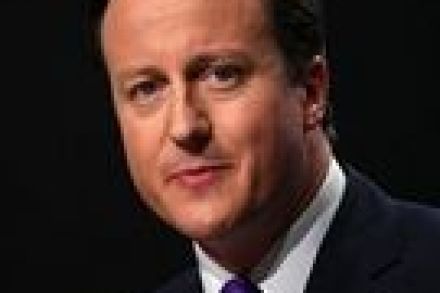Dave will slay the Goliath-esque government
Clever in its lack of cleverness. Cameron’s performance today was shrewd and unexciting, a speech of nursery-school simplicity. Large bland ideas, plain language. No detail. This was certainly no masterpiece. It didn’t have to be. Cameron’s in a holding pattern. Keep circling and he’ll land safely. Before he arrived, William Hague frustrated the eager delegates with two corporate videos of more than ordinary dullness. The BBC, flouting its own policy of censoring political broadcasts, aired both of them on BBC Parliament (albeit with the sound turned down.) First, a surpise. No less a figure than Bono, the UN’s top Guilt Ambassador, spoke to the Tories about debt relief. His message


















